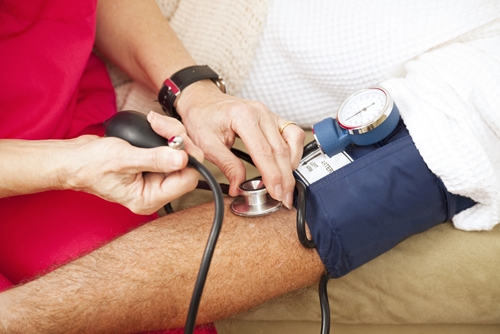Senior Wellness: Controlling High Blood Pressure in Seniors

High blood pressure, known as hypertension, is a dangerous health condition that affects 76.4 million Americans, yet only about half of this group is doing anything to control their blood pressure. High blood pressure in seniors can spur on many other health concerns and issues. According to the American Heart Association, up to 20 percent of people with hypertension may not even be aware of their condition. If left untreated, the dangers of high blood pressure could have serious consequences on your overall health.
For seniors, high blood pressure is even more prevalent. More than half of people over the age of 60 are affected by high blood pressure. However, having the condition does not have to come with age and there are ways to keep blood pressure in normal limits that include senior nutrition and fitness.
Ways to Combat High Blood Pressure in Seniors
Having high blood pressure increases your risk of heart attack, stroke and kidney and heart failure. While there aren’t any symptoms for the disease, getting your blood pressure checked once every year or two can help you know whether or not you are at risk for serious health problems. If your family has a history of heart disease or high blood pressure, getting checked more frequently is a good idea.
Staying Active
Regular physical activity is essential for overall health, but can also have a major effect on your blood pressure. Being inactive is especially dangerous for anyone who already has high blood pressure. Aerobic exercise for 30 minutes five times per week and strength training twice a week can reduce blood pressure and decrease your risk of obesity and heart disease. Exercises that are excellent for senior fitness are walking, swimming, biking and gardening.
Salt Consumption
Too much salt can be bad for your health because it can cause fluid retention in some people which causes the heart to work harder, according to the American Heart Association. While skipping table salt can be a good way to cut back on your daily intake, most sodium that is consumed by Americans comes from processed and packaged foods. For better senior nutrition, whole foods that are unprocessed will reduce the amount of salt in your diet substantially.
Healthy Diet
Eating a diet that is based on more fruits and vegetables can have a very positive impact on your blood pressure and risk of other diseases. Healthy choices like whole grains, low-fat and fat free dairy products, lean meats and fatty fish can provide beneficial nutrients that not only boost your physical well-being, but can have good effects on senior mental health as well.
Caffeine and Alcohol
Many seniors may not know that drinking too much alcohol can raise your blood pressure. The American Heart Association recommends consuming no more than one drink per day for women and two drinks for men. Caffeine can affect people differently, depending on their metabolism. For someone who is able to metabolize caffeine quickly, there may be no effect on blood pressure, but for others who metabolize more slowly, blood pressure can increase. Cutting back to moderate amounts of caffeine can help keep blood pressure in normal ranges.
Change your Sitting Position
Studies have shown that crossing your legs at the knees increases blood pressure, while crossing your ankles has no effect on blood pressure. To prevent your blood pressure from rising while sitting, keep your feet on the ground or crossed at the ankles.
Don’t Smoke
Everyone knows that smoking is bad for your health, but it can have serious consequences for your heart. Smoking has not been proven to cause high blood pressure, but it is known that every cigarette will temporarily raise blood pressure. To lower your risk for heart disease and keep your blood pressure normal, avoid tobacco smoke.
Seeking help to navigate the complexities of Medicare? Reach out to our trusted team at: 844-783-2340.
- How Medicare Advantage Plans Cover Seniors’ Vision, Hearing, and Dental Needs - October 29, 2024
- 2025 Medicare Part D Changes: How to Save on Prescriptions - October 25, 2024
- Everything You Need to Know About the 2025 Medicare Changes and How They Affect You - October 21, 2024

